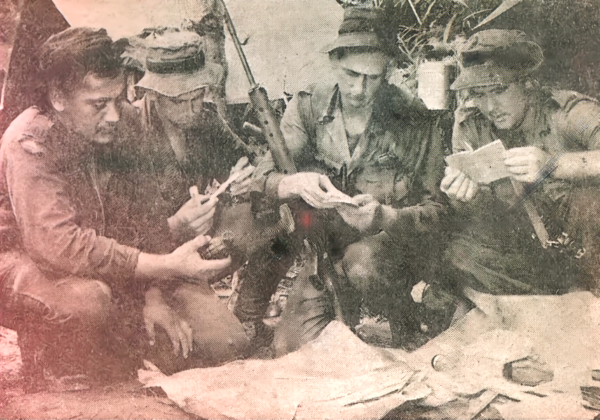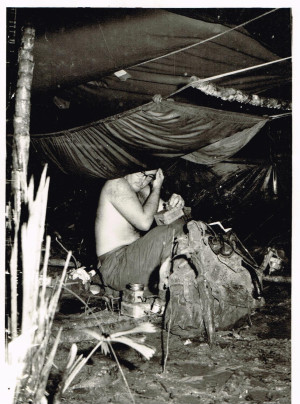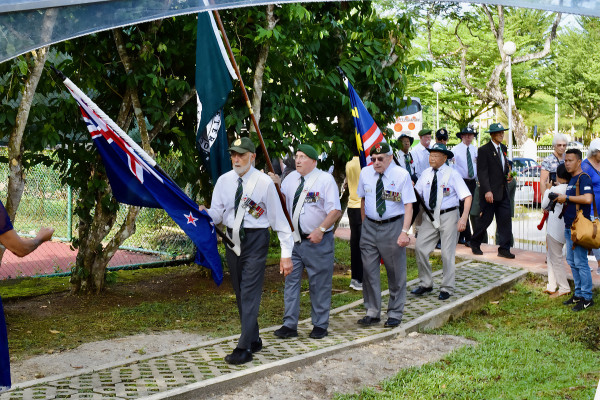Bill Russell: From stamps to signaller and back again
Bill Russell: From stamps to signaller and back again
From beginning his career with NZ Post to initiating a veteran stamp series, and from installing a radio system for the NZ Army and then joining up, Bill Russell’s life is one of crossing paths of his past and his present.
Bill took an early interest in radio. At school, he built his first radio, and to receive global signals he used some ingenuity.
“I wanted my radio to join up on the world-wide network of receivers, but I discovered that the aerial wasn’t big enough, so I tied it to mum’s clothes line and that solved the problem.”
Bill continued to build increasingly more sophisticated radios and tuned into ‘Ham’ radio frequencies including those that used Morse Code. He learnt Morse by tuning to the Navy radio station which at that time transmitted Morse for training purposes.
Following school, Bill joined the New Zealand Post and Telegraph (P&T) as a radio technician, first in Auckland and then at the Himatangi Radio station, near Foxton. There he was also asked to set up a transmitter for the NZ Army at Waiouru and then for HMNZS Irirangi.
Unfortunately, his pay wasn’t covering his board and the cost of running his Model A, so in a significant career change, he became a freezing worker in Makarewa, Invercargill.
Bill and his friends were soon discussing their next step. Bill was keen to work somewhere warmer. A friend knew of someone who had joined the army and was in Malaya (Malaysia). Motivated by the promise of warmer climes, Bill joined in May 1961.
He began his army career at Burnham Camp where the 1st Battalion NZ Regt was reforming to travel to Malaya. He was assigned to Delta Coy, put into 14 platoon for basic training and then transferred to the signals platoon. As per his southern wish for warmth, he was selected for Malaya.
Travelling from Burnham to Malaya was an adventure back then. It meant a train to Lyttleton, a ferry to Wellington, an overnight train to Auckland and then across to Whenupai. Their plane refuelled in Brisbane, then took off for Darwin, but encountered mechanical problems and they had to wait there for a replacement engine to be flown in. They eventually arrived in Singapore before embarking upon the final leg to Malacca, Malaya.
After further training in Malacca, his Battalion was relocated to Alor Setar, a town close to the Thai border. Bill was attached to D Coy and was the OC’s signaller. For 6 weeks they stayed there, patrolling and sweeping areas.
Sometimes Bill would be on the patrol and at other times behind with the OC if he had a SITREP to send or receive. Patrols usually meant sweeping from one track through to another looking for evidence of human presence.
It was on one of those sweeps that Bill came across a small dump, consisting of a kerosene-type tin full of documents and a small amount of ammunition. The find was triumphantly collected and whisked back to Bn HQ for intel to have a look, but they never heard if it was of any value or otherwise.

Bill on the Thai Border, after he found a kerosene tin containing documents and ammunition (Photo: Auckland Star).
Patrolling was heavy work for Bill. He had on a 30kg Bergen backpack, a radio transmitter, and spare batteries. He tried to convince his patrol mates to share the load.
“Pleas to the rest of the platoon to carry some of the heavy spare batteries were dismissed, claiming their packs were heavy and full too.”
They moved to Grik Camp near Sungei Petani Kedah, in northern Malaya. At Grik they met a British Army signals unit.
“They seemed friendly enough other than they were nursing severe hangovers from the previous night.”
One signaller was having trouble sending a Morse message, possibly due to his hangover, so Bill offered to send it on his behalf. But was Bill any better?
“After 2 minutes of sending, back came the message “ZBM2” which in radio parlance means put a competent operator on! I was replaced immediately.”

Bill in the jungle sending a message by Morse. On his knee is a radio battery and he’s holding a morse code sending key.
Bill spent 2 years in Malaya. He had intended to re-sign, but changed his mind, and so in May 1964, Lance Corporal Russell left Burnham for the civilian life.
The Malayan Emergency (1948–1960) was a conflict between the Malayan Communist Party and the British colonial administration of Malaya. About 4,000 New Zealand servicemen served in Malaya between 1948 and 1966. Twenty lost their lives on operational service, three of those as a result of enemy action.
The Veterans Stamp Series
In 2019, Bill approached Veterans’ Affairs and NZ Post with the idea of a series of stamps acknowledging veterans. We would like to thank Bill for this initiative. The Veterans Stamp series will be released in March 2024.
Return to Malaya/Malaysia, 2023
Bill Russell and his fellow Malaya Vets attended the 57th anniversary of the signing of the Malaysia-Indonesia Peace Agreement which brought an end to the Indonesia/Malaya conflict.
They attended a commemoration service at the Sarawak Heroes Memorial Park, Kuching, featuring the New Zealand High Commissioner to Malaysia, Pam Chong Dunn.
The next day the party marched (all of the New Zealand veterans were over the age of 80) in the Independence Day Merdeka Parade, Kuala Lumpur, where they saluted the King and Queen of Malaysia.
The New Zealand veterans also travelled to Malacca to see the camp that many of them spent time in.

New Zealand veterans in the Flag Party are (from front to back): Peter Pangari, Tony Downer, Ray Marshall Rtd. RSM and Eddie Chuah. [Thanks to Tony for sending this to us. Ed.] Photo credit: First published in The Borneo Post, photo by Roystein Emmor.
